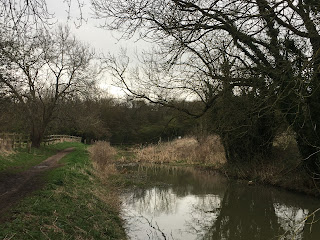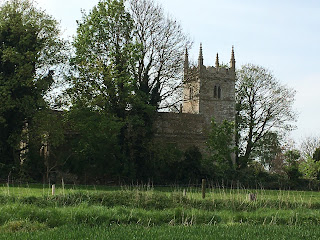DAZED AND CONFUSED
 |
| The Gorilla. Where the Grantham canal meets its nemesis - the A1! |
The gradient of the lane away from the canal towards Barrowby appears slight, but is illusional. As you begin to breast the wold, what looked insignificant now makes the walker blow, or at least this walker. To be fair the guy in singlet and shorts who was running it ahead of me seemed not to slacken his pace at all.
Inside the village limits a man is picking litter. As I pass I say thank you, because even if Barrowby has been a three-time winner of ‘best-kept village’, it’s a horrible, unrelenting, painting-the-Forth-bridge sort of a job. He doesn’t reply, not even a grunt. Well, he may have been deaf, or thought me sarcastic or condescending. Or I wonder, maybe he’s doing a different kind of ‘community service’, and really doesn’t want to be there at all, except it’s preferable to a few days in chokey or a large fine.
All Saints’ church is locked, and as I sit on the bench to catch glimpses of the Vale of Belvoir, all trains and traffic, the sky begins to spit raindrops. The Met Office is often criticised, but in fact rarely gets a lot wrong. However, there wasn’t a hint in today’s forecast about precipitation before early evening. I begin to wonder about the wisdom of today’s yomp. I am, as regular readers know, a fair-weather walker.
Back
in Church Lane a big blue bus has arrived, disgorging a crocodile of children.
‘Been anywhere nice?’ I ask the teacher who’s guarding the rear. ‘Swimming’,
she replies, and I’m transported myself, back sixty-five years to the weekly journey
in an elderly coach through the narrows of Puddledock Lane to the pool, where
before I leave the Maypole County Primary School I achieve the zenith of my
swimming career, second place in the fetching-the-brick-from-the-bottom of the
pool competition. So confined and
Kentish was Puddledock Lane there was always the chance the bus company would
send the wrong, larger coach, which on one occasion found navigation impossible
and got stuck, to our delight, and possibly the teachers’ too.
I’d looked at both the OS and local maps, and come to the conclusion my desired route across the A1 to Great Gonerby was probably unfeasible. So it proves. It’s a problem up and down the length of this particular road. The lanes and paths that crossed it were summarily chopped off, without compensating provision. Beyond the dual carriageway I can see there’s a track leading to Rectory Farm where I could rejoin my preferred route, but a notice warns off pedestrians from trying their luck on what clearly isn’t a right-of-way. The consequence for me is a walk right into the centre of Grantham.
It now takes an average of one hour and eight minutes from Grantham into Kings Cross by train, so in theory it’s as easy a London commute as Northampton ever was. Looking at the layout of the town on the map, it’s clear what will happen. There are plenty of spaces to infill and expand, and down the road from Rectory Farm the development is already well under way, promising a range of 2,3,4 and 5 bedroom houses, probably without any accompanying infrastructure, because of course there’s no reward to the house-builders in providing that.
I’ve ridden this hobby-horse too many times, but how can we reverse the process begun, yes by Grantham’s very own Margaret Thatcher, in the 1980s? It’s convenient for governments to tip the scales of electoral advantage by retaining power while devolving responsibility and (inadequate) finance. A property-owning democracy is all very well, but we don’t have enough starter homes or council houses. Local councils are cash-starved and going bankrupt while having increasing responsibilities. This year the potholes in the road are a real danger to safety. Who’d want to serve as a councillor? Probably many of the people you’d rather weren’t. The National Health Service is a hybrid. It suits the government for it to be so, but as most families know, it’s failing. Either it will have to be ‘re-nationalised’, or we’ll have to go the American route and all buy insurance while the weakest go to the wall and die because they can’t afford it. So, Grantham may go the way of Northampton, becoming increasingly ill-governed, lawless and under-provisioned. Each week brings a scandal about some aspect of government, local or national, but the problems are general, and in need of a more radical (i.e. root and branch) solution. But what can actually be done, short of abandoning democracy? And democracy always has to be the priority.
The Church of England to some degree mimics these trends in secular politics.
I walk towards Great Gonerby on what I suddenly realise is the Old Great North Road. A roadside legend at Gonerby Hill Foot tells me that until 1825 Gonerby Hill was regarded as the steepest hill between London and Edinburgh (was that true? Highgate Hill? Carter Bar?) Now the footpath more nearly follows the original contour while the roadway climbs in a cutting where the gradient is less severe. At the top is St. Sebastian’s church, whose clock tower was habitually under fire from young ‘clockpelters’ in times past. Sadly, it too is locked – as so often churches near major conurbations are, of necessity if vandalism is to be avoided. Clockpelting wouldn’t be the nth of it now.
I retrace my steps into Grantham. At the bottom of Gonerby’s hill are the remains of a stone mounting block. The seventeenth century businessman Edmund Boulter inherited Wimpole Hall, now a National Trust property near Cambridge. He found himself too frequently and at a senior age riding between there and Harewood in Yorkshire, which had also come into his possession. The mounting block at Gonerby Hill Foot is one of a number he had erected for his convenience.
St. Wulfram’s church in the centre of Grantham is a marvel, with the sixth highest spire in the country. As the visitor turns off Swinegate, the tower appears as a sudden confrontation from what is now a rather mundane street. Inside, the church is almost as splendid: the Victorians did a good job. There are many aids to worship and lovely things to see. For me the highlight is John Hayward’s 1970 stained glass depiction of Jesus reaching out to a sinking St. Peter on the north aisle. If I worshipped here, it would sustain me week by week, despite the modern chairs I’d be sitting on - which seem ugly and unworthy of the building. Everything about St. Wulfram’s says that it’s alive, but the notice on the door, which lays out a few terms and conditions of entry, is a little off-putting. St. Wulfram? He was a one-time Archbishop of Sens during the seventh century – the time of the Frankish kings. He tried and failed to convert the King of Frisia, Radbod, whose name makes me smile. I’ve always wished I had a rad bod…but alas… Wulfram’s arm was brought as a relic to Grantham, but got lost somewhere. If you find it, please return to the Rector. The dedication to Wulfram at Grantham is one of just two, the other being at Ovingdean, near Brighton.
Grantham (work in
progress)
It broke our backs.
I knew men
who’d hewn a living
from wrangling
obstinate stone
but in their final age
crept bent in pain
as if they too
hailed from Cyrene.
We saw the tower grow
block on grouted block,
the masters intoning
that Solomon’s temple
in all its glory
was not arrayed like
this;
and that proverbial
Rome
was built in years not
days.
Henceforth
each grubby child
eating dust and worms
would know how great is
God;
the soaring spire seen
from every lowly place
if they could only
raise their eyes.
Three masons plummeted
from the scaffolding,
wooden crosses sheering
apart
as the ropes failed.
Sons have followed
fathers
in the holy task,
assured of heaven
by dint of sweat and
sunburn.
But now I feel the
panic.
Was this all in vain?
For am I Judas
and this a folly not a
glory?
The people suffer
Plague, poverty and
peril.
Perhaps this reversing
alchemy,
turning gold to stone
would be better spent
in relief of the poor.
Did the Lord Christ
ever say
he wanted churches
built?
Yet even incomplete
I know St. Wulfram’s
will foster awe
in centuries yet to
come.
Is that enough?
A prison might do the
same.
So is this work of
grace achieved
In God or Mammon’s name?
The above reflects my uncertainty as to where we go from here. Jesus’ commission to make all people his disciples is best done exactly how in 2024? Through the internet, where quiet voices are so hard to hear? In words, when even convinced Christians find it hard to concentrate for more than five seconds? Or is there a case for our artefacts, including ancient buildings, to be a primary routing of eternal truth? In which case, how on earth can we afford it?
I have the map in my hand as I leave St. Wulfram’s – in fact more than one map, but I can’t make sense of Grantham town centre and don’t know why. The streets don’t seem to correspond, the angles aren’t right, and the clouds are lowering. The breeze is fresh, and so I keep on with it in my face, knowing I’ll find my way to the west, which I eventually do, under the railway and along the Melton road. After a tedious tramp I get to the A1, and on its far side, the beginning of the canal towpath. Two tentative and surreptitious Polish fishermen say hello, pretend to pack up and make their way. Then when I’ve passed by, they begin searching again for neglected fish near the wall of the dual carriageway. What am I misunderstanding?
Harlaxton – Barrowby – Grantham – Great Gonerby – Grantham – Harlaxton
19 km. 4.8 hours. Cloudy but mild. 15 deg C. Some light showers.
‘Dazed and confused’ was a staple of English heavy rockers Led Zeppelin
throughout their (not so very long) career. The track itself had a confused
history, owing much to a song of the same name by Jake Holmes, which Jimmy
Page, Zeppelin’s guitarist heard while he was still a Yardbird, and brought
into his new band’s repertoire at their formation in 1967. The matter was only
resolved in the courts in 2012, by which time reputation rather than money was
at stake, at least on one side. Led Zeppelin were a moment in pop/rock history
where the blues collided with ‘psychedelia’: they were also one of the first
groups to be described as ‘heavy’, though the word had just been re-born as an
adjective to be used more widely in the life of young people cf: ‘heavy trip’, or ‘heavy scene’. It was a style of music I found new and
exciting at first hearing, but its darkness soon struck me as oppressive.
Concerts might be daringly alternative, but became aural assaults, which cost
many their hearing too early in life.
It’s a trope which has continued into ‘metal’ for fifty plus years,
leaving many dazed and confused. As the band Fairport Convention wrote at much
the same time: ‘Too many friends have been/blown off this mountain by the
wind.’







Comments
Post a Comment